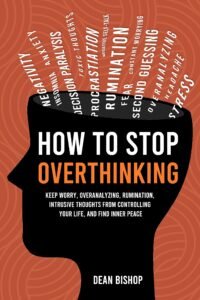Overthinking is somewhat a long-winded and exhausting experience. Your mind reels off with thought after thought, with doubt and fears in between. This relentless cycle of negative thought can leave you feeling anxious, overwhelmed, and unable to focus on where you currently are or what you’re currently doing. Whether it be work, relationships, or life choices, overthinking could get in the way between you, progress, and peace of mind. Thus, many strategies act on, as support groups and approaches help control overthinking so that you can work through life and reclaim control over your own thoughts. Here are helpful guidelines to get you started.
10 ways to stop overthinking:
Table of Contents
1: Become Aware That You’re Overthinking
The first step to controlling overthinking is awareness. It usually starts out small, with a single thought-a worry about work or a relationship or making a choice. But, this thought begins to snowball, twisting itself into an intricate web of complexity. Feelings of worry, doubt, and over-analytical thought can take control over your mental state. Recognize when your thoughts spiral down into this cycle of uncertainty, and take stock in this idea that you might be overthinking. To commit to thinking constructively towards resolution, awareness is essential.

Challenge Your Thoughts
Once you notice you’re overthinking, it’s time to ask whether or not your thoughts are valid. Ask yourself:
- Are these thoughts based in facts or assumptions?
- What evidence do I have which supports or contradicts this thought?
- Is this worry something I can control or change?
- What would be the worst-case outcome, and how probable is it?
Challenging your thoughts can help you step back and notice when you are treating something in an overblown way. Knowing that there is a difference between your worries and reality can help you begin pulling yourself away from unnecessary concern.
3: Set Time Limits for Decision-Making
Most of the time, it is the fear of making the “wrong” choice that leads you to the path of overthinking. One effective way to break off the cyclical pattern that consumes you when making decisions is to set a time limit. Choose a time frame within which to make your decision before you begin analyzing the situation too much. This could be 10 minutes or it could be 1 hour. Give yourself the time frame to end that constant over-analysis.
4: Practice Mindfulness
Mindfulness is a powerful way to regain control over your thoughts. By focusing entirely on the present moment and observing your thoughts from afar, you can create a space between you and overthinking. Simple mindfulness exercises, including deep breathing, progressive muscle relaxation, and guided meditation, can help you settle down and relieve stress.
Mindfulness-based pursuits, such as yoga, walking, or music with calming effect, promote relaxation, whereas remaining centered in your present comforts you to not reflect too much on past mistakes or burden yourself with a lot of fears about what lies ahead.

5: Distract Yourself with Positive Activities
In such cases, your path to halting overthinking may involve productive or pleasant distractions. It may be your hobby, creative outlet, or other things that make you happy, such as working out and spending time with loved ones. Any activity that makes you happy, or one that relaxes you can change your train of thought and keep you away from such negative thoughts. Hence, while doing exercises, our body releases endorphins, which are the natural mood enhancers.
6: Think Solutions, Not Problems
When you overthink, it is easy to become stuck in a cycle of attention toward problems while concentrating on what’s wrong or what could possibly be wrong. Turn the attention toward solutions by asking yourself:
What steps may I take to resolve this problem?
What actions can I control that will improve this situation?
By paying attention to solutions, rather than sinking into problems, you empower yourself to take affirmative steps, thus deeding that feeling of helplessness where overthinking likes to make a habit of dwelling.
7: Be Kind to Yourself
Overthinking can bring along some nasty self-criticism as you might question your decisions or feel guilt for making what you perceive were mistakes. Be kind and treat yourself with compassion, understanding, and patience. In fact, realize that it’s okay to make mistakes; punishing yourself inside just makes it worse because overthinking is a vicious cycle. Instead, acknowledge your feelings, give yourself the permission to learn from experiences, and go ahead with self-forgiveness.

8: Limit Information Intake
In this digitally-oriented world, information bombards us everywhere-in the form of opinions and news. With so many competing distractions, one could fall into overthinking and decision fatigue. To regain control, set limits by reducing access to news and social media while mentally exhausted. Information boundaries reduce mental clutter and induce calm.
9: Talk It Out
A good way of gaining a different perspective is to talk things through with someone you trust. Expressing your concerns to a friend, family member, or therapist helps to bring some underlying emotional support and see things differently. Sometimes, simply having a talk relieves the web of overthinking and gives the gift of clarity.
10: Being OK With Mistakes
Overthinking is often founded on fears of mistakes and a longing for perfectionism. Accept that mistakes are fine, that no decision will ever be 100 percent perfect. Perfectionism tends to be paralyzing; it makes it hard for individuals to act. Acceptance of imperfection puts an individual in a position to make decisions without the weight of excessive worry.
Conclusion
Overthinking can often seem like an impossible habit to break, but with enough practice and the correct strategies, you can take control of the inner workings of your mind and allow for peace and clarity. Start by understanding when you’re overthinking, question those thoughts, and implement strategies such as mindfulness and distractions to draw your mind away. In time, you will develop skills to help put a stop to overthinking and maintain some balance in life-and enjoy it.




